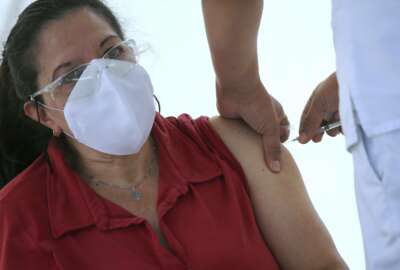
DMV lawmakers want government to have its own batch of COVID vaccines for federal workers
In today's Federal Newscast, lawmakers in the national capital region say the federal government should get its own supply to vaccinate federal workers.
To listen to the Federal Newscast on your phone or mobile device, subscribe in PodcastOne or Apple Podcasts. The best listening experience on desktop can be found using Chrome, Firefox or Safari.
- Senator Mark Warner (D-Va.) wants more information from the FBI and EPA regarding the attempted poisoning of a water supply in Florida. Earlier this month, hackers attempted to infiltrate the system of a water treatment plant in Oldsmar, Florida and increase the amount of lye in the water supply, making it lethal. Warner wants to know where the investigation stands and if the facility was compliant with the EPA’s standards.
- Ahead of a postal reform hearing next week, Congress is asking the Postal Service for an explanation for mail and package delays. Senator Gary Peters (D-Mich.) leads 33 of his colleagues in asking Postmaster General Louis DeJoy for detailed plans on how USPS prepared for historic package volumes this holiday season, and what the agency is doing to improve on-time delivery of mail. Meanwhile 80 House lawmakers press President Joe Biden to fill vacant seats on the USPS Board of Governors.
- Lawmakers in the national capital region say the federal government should get its own supply to vaccinate federal workers. Maryland and Virginia members said their states don’t have supplies to vaccinate essential federal employees in the region. They asked the Office of Personnel Management and Centers for Disease Control and Prevention to take on the responsibility instead. The request comes from seven House Democrats in D.C., Maryland and Virginia. They said they want the federal government to vaccinate its essential workers as soon as possible.
- Congress is concerned about how more extreme weather will affect military bases. Lawmakers plan to look into how military installations handled the ice storms in Texas and surrounding states. House Armed Services Readiness Subcommittee Chairman John Garamendi (D-Calif.) told Federal News Network he wants to hold hearings on the military’s resilience during the storms. The ice left large areas without power or running water. In recent years, military bases have taken a hit from extreme weather. Most notable is Air Force Base Tyndall, which was completely destroyed by Hurricane Michael. (Federal News Network)
- The Army’s XVIII Airborne Corps selected seven soldiers to present ideas on how to better sexual assault and harassment prevention and response. The crowdsourced projects will be presented to a panel of Army leaders who will choose one solution to implement. Ideas coming from soldiers include making SHARP training more involving by asking the best film schools in the nation to make videos. Another soldier suggested creating virtual reality situations of harassment so soldiers can build empathy toward victims.
- The Department of Veterans Affairs has a new chief veterans experience officer. VA hired Marine Corps veteran John Boerstler to the position. He previously led a veterans-focused non-profit. VA also has a new COVID-19 response coordinator. The department hired Christopher Villatoro to a brand new position in the secretary’s office. He spent 14 years in the Marines and at the VA.
- A new review finds the Pentagon has been largely successful in protecting the residents of the federal government’s only two retirement homes from coronavirus. DoD operates two Armed Forces Retirement Homes — one in Washington, another in Gulfport, Mississippi. The Mississippi location recorded just 10 infections among its more than 400 residents last year, and the D.C. location had none. That’s according to a new report by the Pentagon’s inspector general. The IG says the retirement homes do need to develop formal response plans for pandemics. That’s a continuity-of-operations requirement for all federal agencies.
- Roughly 180 appeals are in limbo at the Merit Systems Protection Board due to some complex appointments clause challenges. These cases are separate from the backlog of 3,100 pending petitions for review. Employment attorneys say MSPB administrative judges are dismissing some initial appeals without prejudice over concerns with how the judges have been appointed. Those concerns stem from a 2018 Supreme Court decision. The cases are sitting for now while the MSPB lacks a quorum. (Federal News Network)
- Cybersecurity experts from across the government are preparing to show off their skills in the finals of the President’s Cup Cybersecurity Competition next week. Five teams made up of five people and 20 individuals will compete on February 25 to win the governmentwide cybersecurity contest. In this second year of the competition, the Homeland Security Department says these teams and individuals remain from the 1,400 unique competitors across all 3 tracks who began the competition earlier this month. CISA will livestream the finals on February 25.
- The National Institutes of Health is launching a new data sharing policy for research it funds. Under this new policy, researchers applying for NIH grants will need to submit a data management and sharing plan with their grant application. NIH’s Associate Director for Data Science Susan Gregurick says the new policy will go into effect in March 2023. “In that plan, we’d like you to articulate how you intend to share data and the metadata associated, where you intend to share it, and if you can’t share the data, what are the principles behind not being able to share the data.”
- DARPA has a new plan to accelerate the adoption of 5G, edge and IoT technologies. The Defense Advanced Research Projects Agency is turning to open source developers to help further the software behind many of today’s current emerging technologies. DARPA signed an agreement with the Linux Foundation to create a broad collaboration umbrella called the US Government Open Programmable Secure or US GOV OPS. The new group will let the open source community participate on federal projects within their ecosystem to accelerate innovation and security in the areas like 5G, edge, AI, standards, programmability and IoT. The first effort will be around 5G with DARPA, the Navy and others participating.
Copyright © 2024 Federal News Network. All rights reserved. This website is not intended for users located within the European Economic Area.
Eric White
Eric White is news anchor and Federal Drive producer at Federal News Network.
Follow @FEDERALNEWSCAST
Related Stories

New study says sexual assault in the military is starting to hurt overall strength
(Getty Images/Wavebreak Media/Wavebreakmedia Ltd)

Complex appointments clause challenges throw some MSPB cases in limbo






